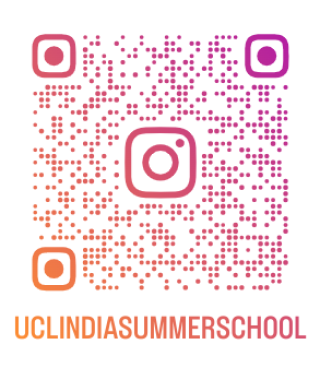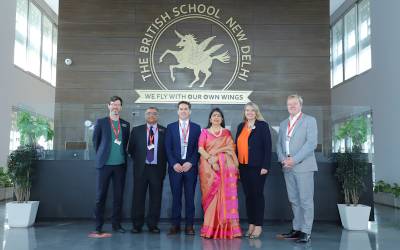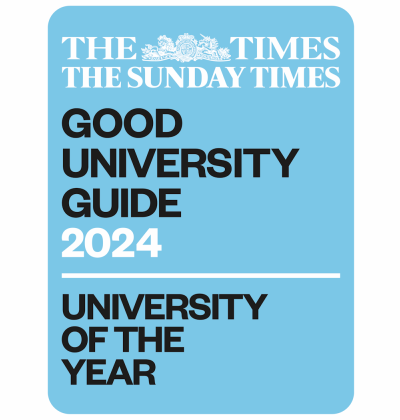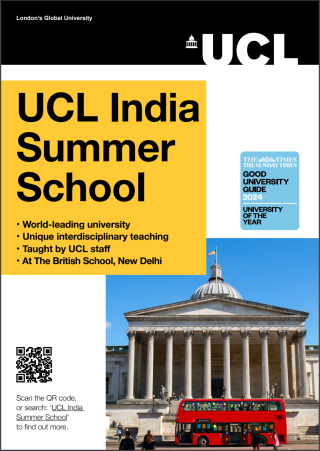UCL India Summer School
Based at the state-of-the-art campus of The British School New Delhi, the 2024 UCL India Summer School gave pre-university students in India a taste of what it’s like to study at a world-leading UK university. It aimed to widen access to education by bringing UCL professors to India from London. It was targeted at current Grade 11 students in India, who gained from a rigorous and exciting curriculum taught in person by professors from one of the world’s leading universities.
For any enquiries, please contact vpee.indiasummerschool@ucl.ac.uk.
Register your interest for 2025
More about 2024 UCL India Summer School
Where and when
- Dates: Monday 10 June – Friday 14 June 2024
- Timings: 9am-4pm daily
- Location: The British School New Delhi, Dr Jose P Rizal Marg, Chanakyapuri, New Delhi 110021
Cost
UCL’s India Summer School is a non-profit, access-to-education programme that marks our desire to engage with India in a spirit of partnership.
The Summer School fee for the 2024 programme was INR 38,000. This fee was set as low as possible. The fee will was payable in rupees directly to The British School New Delhi.
No profits accrued to either The British School New Delhi or UCL.
Teaching and learning
Our cutting edge, multi-disciplinary teaching programme was taught in person by professors travelling to India from London for one week.
The Summer School required participants to think creatively, across disciplines, and to apply high-level knowledge and analysis to solving real-world problems.
Students received immersive seminar teaching (class sizes capped at 10) in their chosen pathway subject.
Students on the 2024 programme chose from one of the following pathways:
[n.b. pathways for 2025 are subject to review]
- Psychology and the Human Brain
This seminar series introduced students to the foundational ideas and everyday applications of experimental psychology and neuroscience. Through this approach, we covered a range of topics such as the mind and the brain, perception, behaviour change, knowledge and learning. Experiencing this cycle of enquiry and evidence gave students the psychological literacy to integrate knowledge across psychology and apply it to the world around them. Each seminar was framed by a simple question, such as:
- Why do people see ghosts?
- Can you trust your memory?
- How can you change people’s behaviour?
We used the scientific method and cut across traditional disciplines looking for answers. Students were introduced to key conceptual issues, methodological approaches and significant findings in scientific psychology, their historical background, and the kinds of empirical evidence on which these findings are based. Students were encouraged to think critically and evaluate their own behaviour through in-class experiments. A scientific approach was developed through an appreciation of how empirical data can be used to test competing theories.
- Medical Sciences and Artificial Intelligence
Forget sci-fi robot surgical assistants (that’s the reality now, not the future), we explored the real-world ways AI is revolutionising the diagnosis and treatment of human diseases. From pandemics to personalised medicine, AI is helping us prepare for the future, deciphering medical images with superhuman accuracy and predicting disease outbreaks before they happen. AI is rewriting the healthcare rulebook. Think you need a PhD to understand it? Absolutely not! This series was designed for young people with a passion for science, technology, and medicine. No prior knowledge was needed, just boundless curiosity and a thirst to explore the unknown. Some of the questions we considered include:
- Can AI replace doctors?
- How does AI spot cancers the size of a grain of rice on a scan?
- How can AI help us predict the unpredictable in medical science?
- What about the downsides of AI?
To answer these questions, we cracked open the AI toolbox to understand how algorithms learn to recognize diseases, recommend treatments, and even perform virtual surgery. We explored how algorithms predict disease outbreaks, and tailor treatments to your DNA. With great power comes great responsibility, and AI in healthcare is no exception. So, we considered and debated the ethical challenges of AI in medicine, from privacy to bias, and discussed how to ensure AI serves humanity for good – not harm. We also delved into the magic of medical imaging to see how AI is giving doctors superpowers to see inside the body like never before.
- Creative and Cultural Industries
In today’s world, machines can perform more and more complex tasks. Likewise, humans can do more and more with the assistance of machines. This seminar series took students into the world of human creativity and culture, giving them ideas, tools, and approaches that enabled them to address problems through collaboration and creativity. We combined philosophical exploration and cultural criticism with practical exercises, to ask:
- What is it that humans can, and need to do that machines can’t?
- What is the nature of creativity, understood in different contexts as divine inspiration, an emulation of nature, the work of an individual genius, the expression of an unconscious, or the product of chance, play, and experiment?
- What are the ethical and political dimensions of creativity: who gets to be a ‘genius’?
- What are the ethics of using experience from life as material?
Exploring philosophical ideas and cultural histories, this seminar series invited students to learn in a hands-on fashion, finding out how modes such as play, disruption, randomness, the automatic and unconscious, even failure, copying, and ‘uncreativity’, can all result in creative outcomes. These methodologies apply not only in creative and cultural industries, but in any organisation where problem solving, innovation, and imagining alternative futures is necessary — that is, everywhere you will study and work in the future!
- Management, Business, and Law
Game Theory is a key theoretical approach in economics that is often applied in business, management, and law. This pathway helped students to understand the principles of Game Theory and how Game Theory can be applied in real-world situations. Game Theory is a theoretical framework for understanding motivations and rational actions among competing players. Game Theory could be described as a science of strategy. It is an exciting and relevant subject for students, which you can apply to analyse any strategic environment. During the course of the seminar, we asked:
- What is a ‘game’ in Game Theory?
- How can we model real-life situations as ‘games’?
- How do we ‘solve’ games using key approaches strategies?
Students explored the core concepts and tools of Game Theory, such as ‘Nash equilibrium’, mixed strategies, sequential games, Extensive Form games, Perfect Equilibrium, and Incredible Threats. They also saw how Game Theory can be applied to various topics in business, management and law including: incentives and optimal contract design; principal-agent problems; cartels and anti-competitive practices, as well as wider social and economic questions such as industrial organisation; voting; environmental issues; and ‘arms races’. We explored how to bid in a competitive tender; price competition; quantity competition; and how to give incentives to individuals, firms, or countries to do certain things, such as reduced carbon emissions. The course prepared students for more advanced courses in economic theory and enhanced their analytical skills.
- Climate Change and Cities of the Future
Currently around 49% of people in India live in slums or informal settlements in cities. They are the key engines and workforce of cities and bear the double burden of poor housing and infrastructure, as well as the adverse impacts of climate change. Climate change is a reality and is now a crisis reflected in summers which are hotter, and in erratic rainfall patterns. This seminar series reflected on vulnerable communities in India’s cities with a view to addressing those challenges for the ‘cities of the future’. We received a visit from community leaders on Day 1 and then reflected on the following questions:
- What are the day-to-day lived experiences of people living in slums?
- How are slums currently coping with poor housing and infrastructure, combined with climate impacts?
- What are the key priorities and needs of communities from a built environment perspective?
- Why does climate justice matter?
- How can our future cities become more climate resilient and equitable?
We considered day-to-day lived experiences of residents who live in poor housing stock with limited infrastructure services. As part of this exercise, we thought about which services are most important to slum dwellers to make a case for funding. We will also examined the benefits of good infrastructure, built environment, and sustainability and the intersections of these with climate change. A group activity on the United Nations Sustainable Development Goals (UN SDGs) enabled students to show the wide-ranging benefits of improving living conditions in slums on health, education, environment, income, and poverty.
- Public Policy in Science, Engineering, and Technology
What is it that connects - and has a strong impact on - business, law, science, engineering, and technology today? The answer is public policy, which has the power to create environments that foster innovation and build just and more inclusive societies. Some of our biggest challenges are transdisciplinary in nature: climate emergency, unsustainable resource consumption, food insecurity, the rise of persistent conflicts, technological advances, and global health crises. These problems are interconnected. They require knowledge from science, engineering, technology, and social sciences to create innovative and concrete solutions. This pathway reflected on some of these challenges through the lens of public policy and its design, looking analytically at how we can create an enabling environment for solving these urgent problems. No prior knowledge was required here, just a thirst for learning new things and imagining the world through different lenses! Each seminar was framed by a question, such as:
- What is public policy, and why does it matter in the context of science, technology, engineering and related disciplines?
- How can public policy design drive socio-technological innovation?
- How can Artificial Intelligence (AI) be used for engaging citizens in solving policy issues for science, engineering, and technology?
- How is the ‘nudge’ agenda in policy being used to solve society’s ‘wicked’ problems?
To explore these questions, we covered core concepts around the design of public policies, thinking about actors and institutions, citizens, local communities, civil society, politicians, government bodies, all of which constrain and shape the policymaking process for bringing about social change. These seminars had a strong applied focus, where students were encouraged to think analytically and share their ideas through interactive exercises such as role play, real-life simulation exercises, and debates. A group activity on one of these transdisciplinary problems - such as air pollution - along with presentation of its findings enabled students to understand the challenges and opportunities governments face in solving these complex policy issues in science and engineering.
All students also benefited from the interactive lecture course ‘Disagreeing Well: arguing, listening, and learning in academia (and life)’, as well as a range of study skills, careers, and alumni engagement sessions.
On completion
In addition to their academic tuition, all students received a certificate of participation.
The summer school programme culminated in an afternoon of student presentions based on their work in the pathways, and a valedictory ‘high tea’ event for family, friends, and professors.
Eligibility
- Admission was by merit, based on class 10 public examination results or equivalent (e.g. IGCSE or IB pathway results results).
- For admission to the UCL India Summer School 2024, the minimum average overall score in the class 10 public examination was 90%, with a minimum 90% mark in English.
- The UCL India Summer School was non-residential.
 Close
Close





